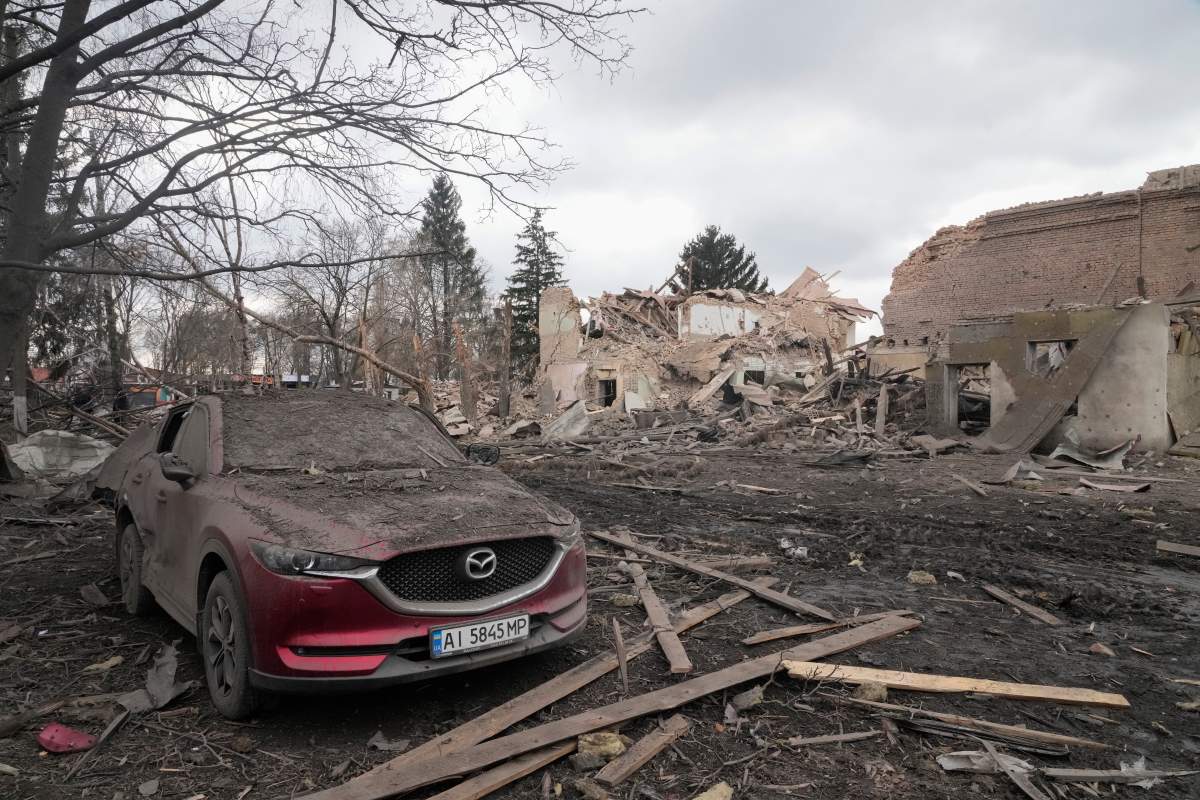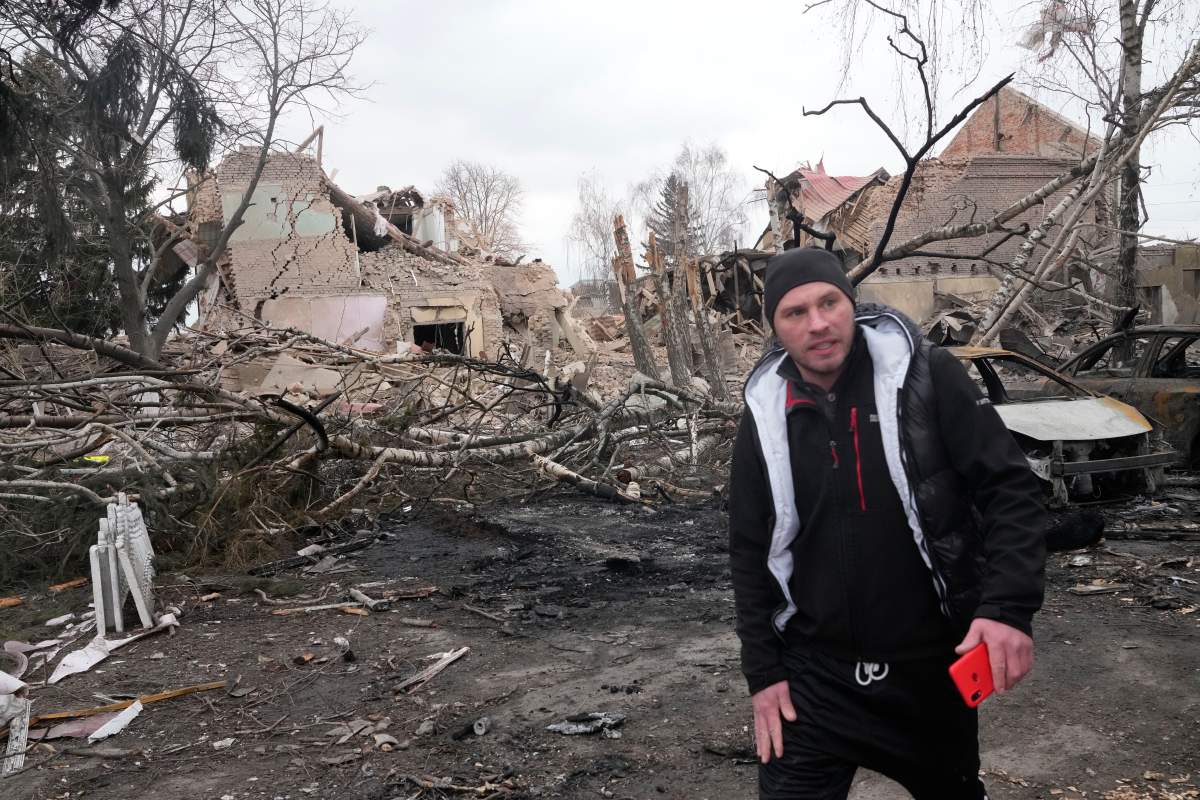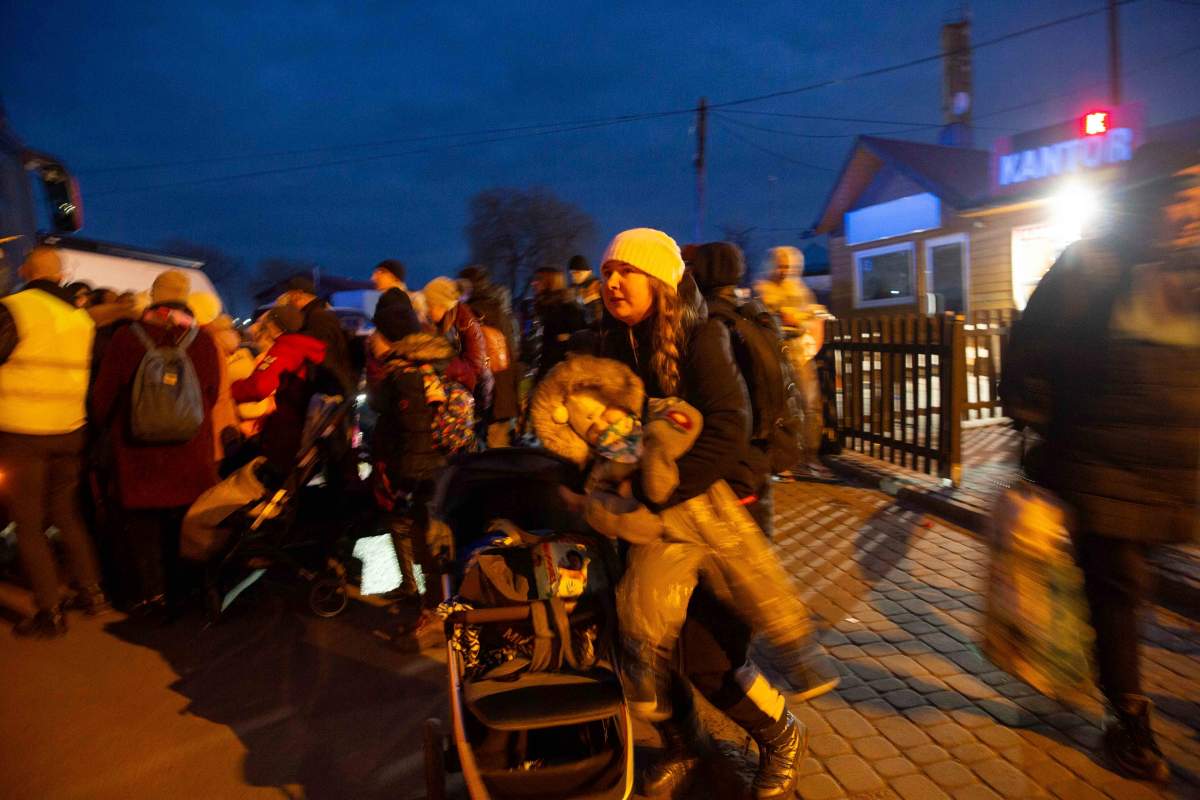The latest updates as of 11 p.m. EST Friday:

- The U.S. Embassy in Ukraine has called Russia’s attack on a nuclear plant a ‘war crime.’
- CBC, CNN and Bloomberg say they are suspending reporting from journalists in Russia due to a new law that could place them in jail.
- Bombardier and Canadian Tire have suspended all Russia-linked operations due to Ukraine’s invasion.
- “By the grace of God, the world narrowly averted a nuclear catastrophe last night,” said the U.S. ambassador to the UN at an emergency meeting of the Security Council.
Russia’s seizure of Europe’s largest nuclear power plant in Ukraine on Friday drew widespread criticism across the world as war rages on in the region.
Moscow’s attack at the Zaporizhzhia nuclear power plant, near the town of Energodar, resulted in at least one fire that firefighters put out, Ukrainian and UN officials said.
There were no changes to radiation levels at the plant following intense fighting and shelling, the officials added.
“By the grace of God, the world narrowly averted a nuclear catastrophe last night,” said Linda Thomas-Greenfield, the United States’ ambassador to the UN, at an emergency meeting of the Security Council on Friday.
“Russia’s attack last night put Europe’s largest nuclear power plant at grave risk. It was incredibly reckless and dangerous, and it threatened the safety of civilians across Russia, Ukraine and Europe. … Nuclear facilities cannot become part of this conflict.”

The world’s leading nuclear authorities said they were concerned — but not panicked — about the damage to the power station, which generates about one quarter of Ukraine’s power.
The head of the UN’s atomic agency said that a Russian “projectile” hit a training centre at the Zaporizhzhia plant, and not any of its six reactors. Ukrainian officials have said Russian troops took control of the overall site, but the plant’s staff are continuing to ensure its operations.
The attack was the latest in several bloody events since Russian President Vladimir Putin ordered his troops into Ukraine on Feb. 24.
“These unacceptable attacks by Russia must cease immediately,” Prime Minister Justin Trudeau tweeted Thursday night after speaking with Ukrainian President Volodymyr Zelenskyy.

U.S. President Joe Biden also spoke with Zelenskyy on Thursday, and the White House said Biden joined his Ukrainian counterpart in urging Russia to “cease its military activities in the area and allow firefighters and emergency responders to access the site.”
The U.S. Embassy in Ukraine said in a statement the attack is a war crime, going further than any U.S. characterization of Russia’s actions in Ukraine since it launched its invasion on Feb. 24.
“It is a war crime to attack a nuclear power plant. Putin’s shelling of Europe’s largest nuclear plant takes his reign of terror one step further,” U.S. Embassy Kyiv said in its post.
On Wednesday, Biden stopped short of calling Russia’s actions war crimes, saying, “It’s too early to say that.”

Get daily National news
In an emotional nighttime speech, Zelenskyy said he feared an explosion that would be “the end for everyone. The end for Europe. The evacuation of Europe.”
NATO Secretary-General Jens Stoltenberg called the attack “reckless” on Friday, and demanded Putin withdraw all troops from Ukraine without conditions.
Ukraine’s state nuclear plant operator said that three Ukrainian soldiers were killed and two were wounded in the attack. Rafael Mariano Grossi, director general of the International Atomic Energy Agency (IAEA), said two people were injured in the blaze that broke out.
The IAEA said it had been informed by Ukrainian officials that no “essential” equipment at the station was affected by the attacks or resulting fire.
Russia’s defence ministry said the plant was working normally, and blamed the fire on an attack by Ukrainian saboteurs and said its forces were in control.
France activated the crisis centre of its nuclear watchdog after the fire at nuclear plant broke out, using the country’s expertise in nuclear radiation to monitor developments; the Canadian Nuclear Safety Commission is in a “state of enhanced monitoring” in line with its emergency plan.
Russia has already captured the defunct Chernobyl plant, some 100 kilometres north of Ukraine’s capital, Kyiv. Some analysts noted the Zaporizhzhia plant is safer than Chernobyl.
Ukrainian Prime Minister Denys Shmyhal appealed to the IAEA and the EU to send representatives to all five Ukrainian nuclear power plants. “This is a question of the security of the whole world,” he said in a nighttime video address.
Fighting continues elsewhere in Ukraine
In other parts of the country, Russian forces surrounded several cities in the second week of the war launched by Putin.
A presidential adviser said an advance had been halted on the southern city of Mykolayiv after local authorities said Russian troops entered it. Regional Governor Vitaliy Kim said Friday Russian forces were driven out of the city, but fighting continued around its outskirts.
Only one sizeable Ukrainian city — the southern port city of Kherson — has fallen to Russian forces.
Kyiv, which has a huge Russian armored column slowly approaching, came under renewed attack, with air raid sirens blaring in the morning and explosions audible from the city centre.
In the northeast, Kharkiv and Chernihiv have been under bombardment since the start of the invasion. Strikes have intensified but Ukraine’s forces are holding out.

In the city of Mariupol, Mayor Vadym Boychenko said in a televised address the city has no water, heat or electricity and is running out of food after coming under attack by Russian forces for the past five days.
“We are simply being destroyed,” he said.
Since the war began, Zelenskyy has called for Western powers to enforce a no-fly zone over Ukraine. Western nations have been providing economic support and lethal aid to assist the nation in its fight against Russia, as well as economically punishing Moscow for its invasion.
Stoltenberg reaffirmed Friday NATO will not enforce a no-fly zone over the nation as it could result in a war spreading across Europe.
After a meeting with NATO foreign ministers, Stoltenberg said allies “agree we should not have NATO planes operating in Ukrainian air space or NATO troops on Ukraine’s territory.”
“At the same time, we have a responsibility as NATO allies to prevent this war from escalating beyond Ukraine because that would be even more dangerous, more devastating and would cause even more human suffering,” he said.
The only way for NATO to implement a no-fly zone would be to send NATO planes to shoot down Russian ones, Stoltenberg added.
On Thursday, Zelenskyy said if allies wouldn’t meet his request to protect Ukrainian air space, they should instead provide Kyiv with more war planes.

Thousands of people are believed to have been killed or wounded and more than 1.2 million refugees have fled Ukraine since Feb. 24.
Foreign ministers from the G7 said Friday that those responsible for Russian military attacks on civilians in Ukraine must be held accountable for their crimes, amid reports of the use of cluster bombs and other banned munitions.
In a statement, the ministers said they’re “deeply concerned with the catastrophic humanitarian toll taken by Russia’s continuing strikes against the civilian population of Ukraine’s cities.”
Russia calls its invasion of Ukraine a “special operation” that it says is not designed to occupy territory, but to destroy its southern neighbour’s military capabilities and capture what it regards as dangerous nationalists.
In the weeks leading up to the war, Moscow had built up roughly 150,000 troops near the border, and continuously denied Western accusations it was planning an invasion of Ukraine.
On Friday, Putin told his German counterpart Olaf Scholz that Russia is ready for talks with Ukraine, but insisted it must meet Moscow’s demands.
Ukraine must agree to demilitarize, accept Moscow’s sovereignty over Crimea, which it annexed in 2014, and surrender territory to Russia-backed rebels in the east, the Kremlin said in its readout of the call.
On Thursday, Russian and Ukrainian negotiators agreed at talks on the need for humanitarian corridors to help civilians escape and to deliver medicines and food to areas engulfed in fighting.
— with files from The Associated Press and Reuters.












Comments
Want to discuss? Please read our Commenting Policy first.